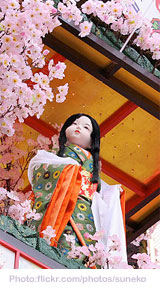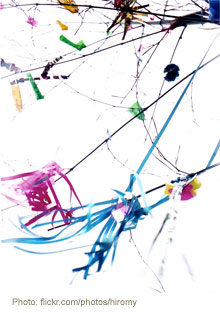p>The 7th of July is 七夕 (たなばた – tanabata). In English it is known either as the “Festival of the Weaver” or the “Star Festival”, both in reference to a legend regarding two stars: Altair and Vega.
The legend was originally from China, and it seems the story changed a little in the Japanese version. Anyway, the story goes roughly as follows.
The Story of Kengyuu and Orihime
 Once upon a time, a young man named 牽牛 (けんぎゅう – Kengyuu, the Japanese name for Altair) fell in love with a young woman named 織姫 (おりひめ – Orihime, the Japanese name for Vega). They loved each other so much, they forgot their own work as cowherd and weaver. The 神 (かみ – kami – God) of Heaven got angry about this, and the lovers were split apart by the two banks of 天の川 (あまのがわ – amanogawa – the Milky Way). Since that time, they’re allowed to meet only once a year, during the night of the 7th of July.
Once upon a time, a young man named 牽牛 (けんぎゅう – Kengyuu, the Japanese name for Altair) fell in love with a young woman named 織姫 (おりひめ – Orihime, the Japanese name for Vega). They loved each other so much, they forgot their own work as cowherd and weaver. The 神 (かみ – kami – God) of Heaven got angry about this, and the lovers were split apart by the two banks of 天の川 (あまのがわ – amanogawa – the Milky Way). Since that time, they’re allowed to meet only once a year, during the night of the 7th of July.
Thus, we regard that day as a romantic day, and actually lots of events for lovers and about 星 (ほし – hoshi – stars) take place here and there. Lots of artists tend to give concerts named after 星 (stars) around this season.
Make a Wish
 The day of 七夕 (tanabata) is not a holiday, but there are events which some people, especially children, look forward to. One big tradition is this: You might see bamboo “trees” (they’re not real trees, though) which have lots of colorful 短冊 (たんざく – tanzaku – strips of paper) in the backyard of a house. Anyone can write a wish on a 短冊 (strip of paper), and hang it from the bamboo branches. If the sky is clear on the night of 七夕, your wish might be accepted by 神様 (かみさま – kamisama – God) of Heaven. But you must give up it when it’s a rainy night. In fact, the poor lovers (Altair and Vega) can’t meet either on a rainy night, so they must wait for next year.
The day of 七夕 (tanabata) is not a holiday, but there are events which some people, especially children, look forward to. One big tradition is this: You might see bamboo “trees” (they’re not real trees, though) which have lots of colorful 短冊 (たんざく – tanzaku – strips of paper) in the backyard of a house. Anyone can write a wish on a 短冊 (strip of paper), and hang it from the bamboo branches. If the sky is clear on the night of 七夕, your wish might be accepted by 神様 (かみさま – kamisama – God) of Heaven. But you must give up it when it’s a rainy night. In fact, the poor lovers (Altair and Vega) can’t meet either on a rainy night, so they must wait for next year.
Since it includes such sadness, many writers and musicians want to weave the story of Altair and Vega in their works. On the other hand, it’s attractive as well; for example. at an elementary school, you can see larger bamboo branches which are full of colorful 短冊 (strips of paper) on which pupils’ wishes are written. In some streets in shopping areas, each store might display more gorgeous bamboo with 短冊 (strips of paper) and other things.
Tanabata for Children
Here is an event which is even more fun for children. From the afternoon to the evening of 七夕, small groups of children visit houses in their neighborhoods. They wait for someone from the house in front of the door, and start to sing as soon as the door is opened:
ろうそく 出せ 出せよ
出さないと ひっかくぞ
That means : Hand over a candle, or you’ll be scratched!
That’s similar to “trick or treat” on Halloween, no? Anyway, children are supposed to be given お菓子 (おかし – okashi – sweets and snacks) after the chant. Of course nobody offers any ろうそく – rousoku – candles), and children don’t expect such stuff, lol. They can visit lots of houses, so hopefully they can get a large amount of treats. Recently, some stores sell small bags and boxes of お菓子 (sweets and snacks) for 七夕 so that people can prepare for the visitors more easily. In fact, some children are too shy to sing the chant, but anyway they want to go out to get the precious things.
But this event varies from region to region. The chant above is sung here in Sapporo, and it’s heard in some other towns as well. But other towns may have different chants, and there are some places which don’t have this custom, I hear. Therefore, if you visit someone who moved from such a place, you can’t expect any sweets.
Besides, 七夕 is on the 7th of August in some regions including here in Hokkaido. So, if the sky is clear, the eternal lovers may be able to meet twice a year. It’s usually only children who write their wishes on 短冊, (strips of paper), but if you have someone special, you might write your wish secretly.
Notes About Stars
Here is some vocabulary regarding stars:
- 北斗七星 (ほくとしちせい – hokuto shichisei – the Big Dipper (Ursa Major))
- 流れ星 (ながれぼし – nagareboshi – a falling ster)
- 星座 (せいざ – seiza – constellation)
- 星占い (ほしうらない – hoshi uranai – astrology)
- プラネタリウム (puranetariumu – planetarium)
- 銀河系 (ぎんがけい – gingakei – the Galaxy (“ginga” means “silver river”))
In a detective novels and films, the word “星 (hoshi)” refers to the culprit.
必ず星を捕まえろ。
Kanarazu hoshi o tsukamaero.
Catch the wanted man without fail!
Personally I like the English expression “Milky Way”, but I think Japanese version “天の川” which means “a river of heaven” literally is lovely as well. I’m curious about the expression in your places. What is The Milky Way called in your language?